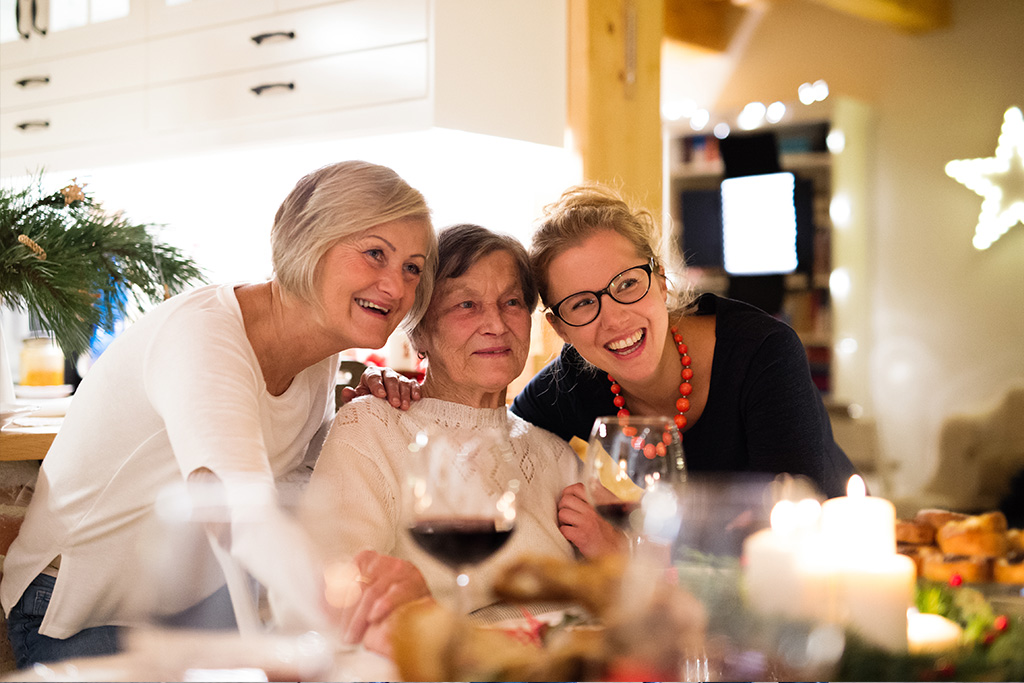Caregiving Tips for the Holiday Season
With Thanksgiving knocking on your door and ushering in the holiday season, the stress of juggling work, family commitments, holiday shopping, and hosting preparation can take its toll. Although you may be thankful for having the opportunity to create more holiday memories with your friends and family, you may also experience mixed emotions if you are the caregiver of an elderly relative during the busiest time of year.
Since your days are likely to be filled with more commitments than usual, it may take some additional thought to manage your schedule. If you are one of the almost 60 percent of caregivers who work outside the home and are also the primary source of care for an elderly parent or another loved one, now is the perfect time to start planning. It’s important to be as flexible as possible as you manage both your and their needs.
Preplan for their holiday visit

The ways you have celebrated in the past may no longer be viable if there has been a change in your loved one’s physical or mental health. For example, they may be uncomfortable being in the company of a lot of people or have difficulty ambulating up the stairs or to the bathroom. Your concerns and preparations needed for an older relative may differ this year, so consider the following tips to help make your holiday celebration easier and more enjoyable.
- If you’re hosting the main holiday meal, determine what time of day is best for your loved one to fully enjoy the festivities.
- Ask a family member to help watch them during the holiday celebration while you’re busy hosting.
- If your relative needs transportation to and from your home, plan well in advance. Be sure to make provisions for them should they need to leave early if they begin to feel anxious or overtired.
- Find ways to keep them occupied as you prepare, such as wrapping presents, making holiday cards for the grandchildren, listening to holiday music, or watching an entertaining movie.
- If they are able, ask them if they want to make their favorite holiday dish, which can help to lift their spirits because they will be contributing to the holiday meal.
- Consider asking your guests to bring their favorite dishes if you’re feeling the pressure of having to do it all: decorate, cook, serve, and clean.
- Determine what’s best for you as the host and caregiver. Maybe skip some of the traditional customs and only pick the ones most important to you and your family.
- If you have decided that it’s not feasible to host a big family celebration this year, consider recreating the holiday by scaling back to a smaller group.
Recognize the signs of caregiver stress

If you are the primary caregiver, it’s important to periodically do a self-care check to assess how you’re feeling mentally and physically. If you’re experiencing any of the following caregiver stress symptoms, it may be time to reevaluate your expectations and shift gears.
- Short-tempered and easily irritated
- Depressed, anxious, overwhelmed, or worried
- Questioning your caregiving capabilities
- Focused on negative thoughts rather than positive ones
- Lack of sleep or exhausted
- Not exercising as usual or engaging in poor eating habits
- Loss of focus and motivation
- Persistent aches, pains, and headaches

Balancing family caregiving responsibilities with the busy holiday season may leave you feeling overwhelmed, but you can minimize this stress and anxiety by being flexible and managing your time wisely. Doing so can help you maintain control in an often-challenging situation and help you and your family to have a happier holiday season.



